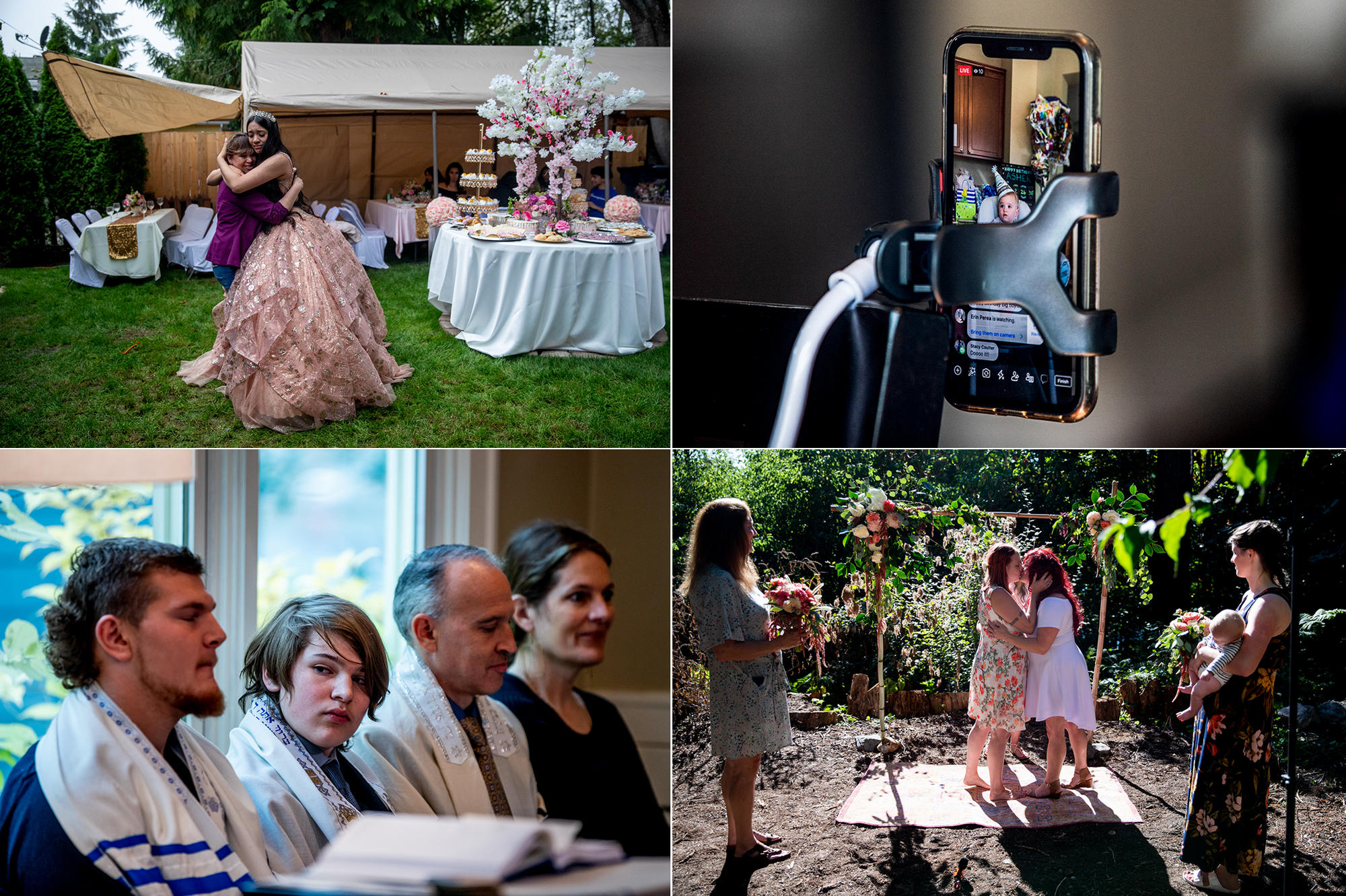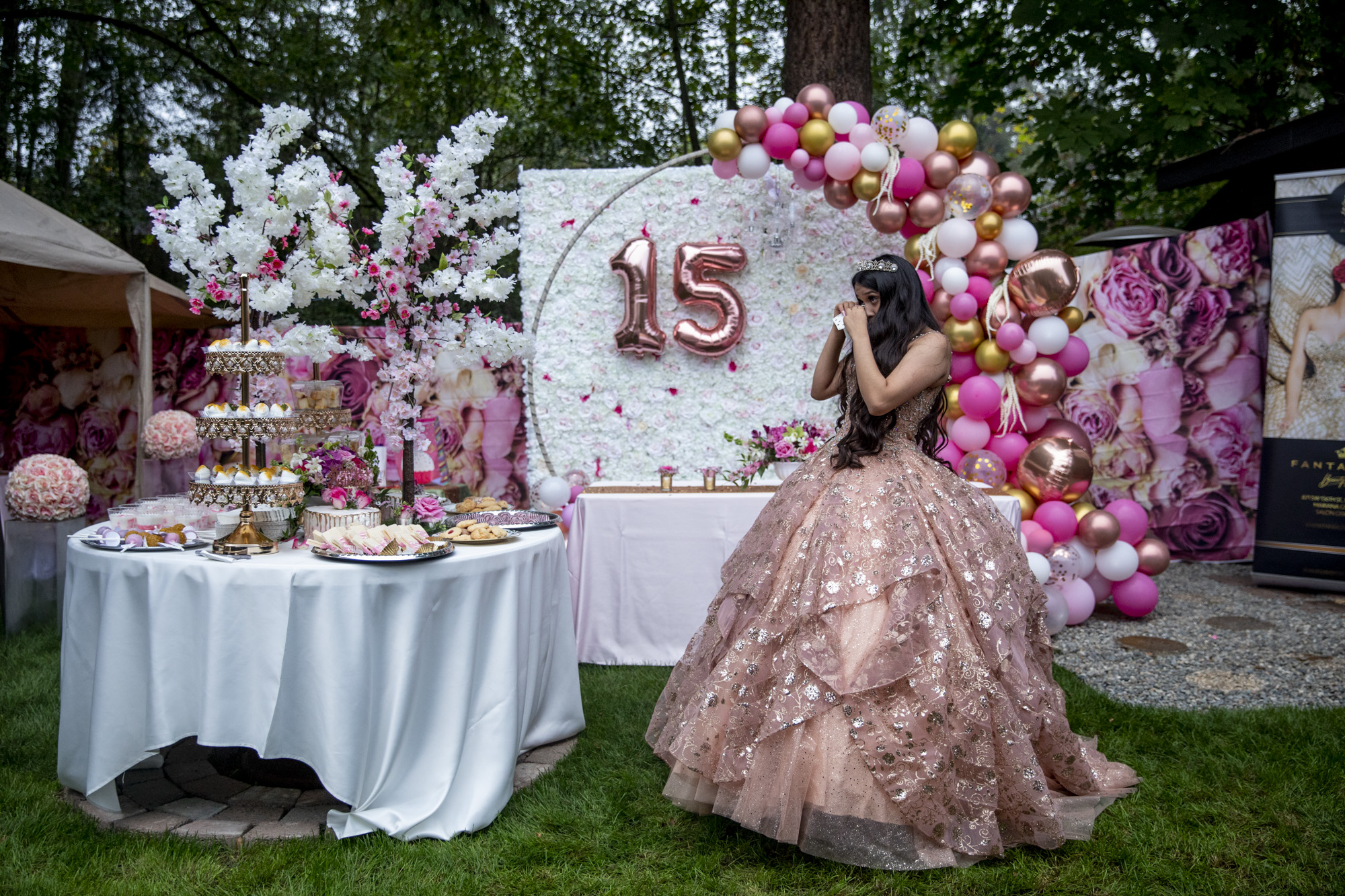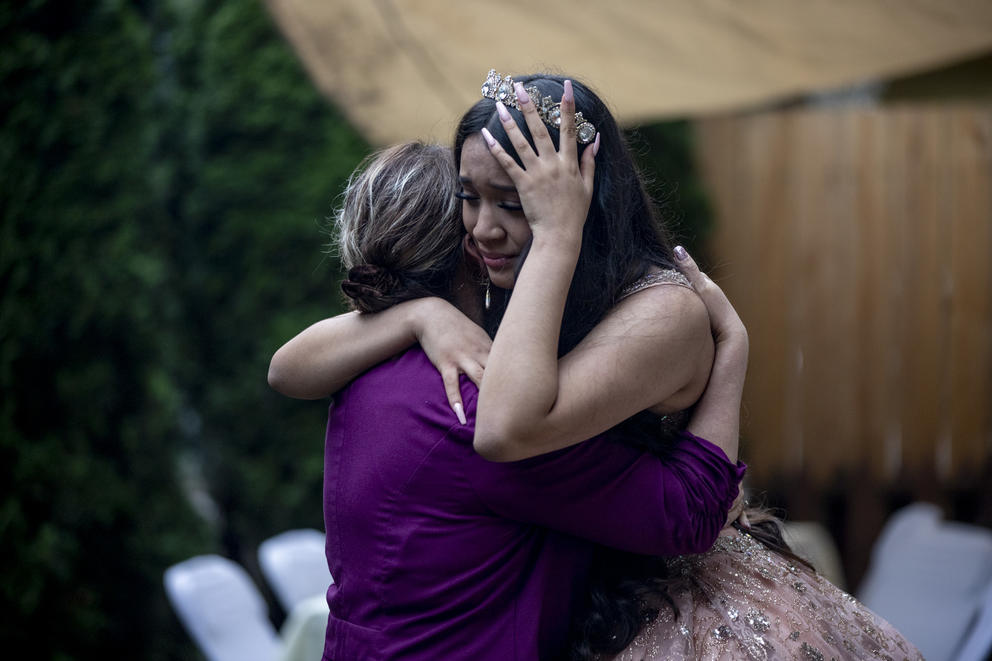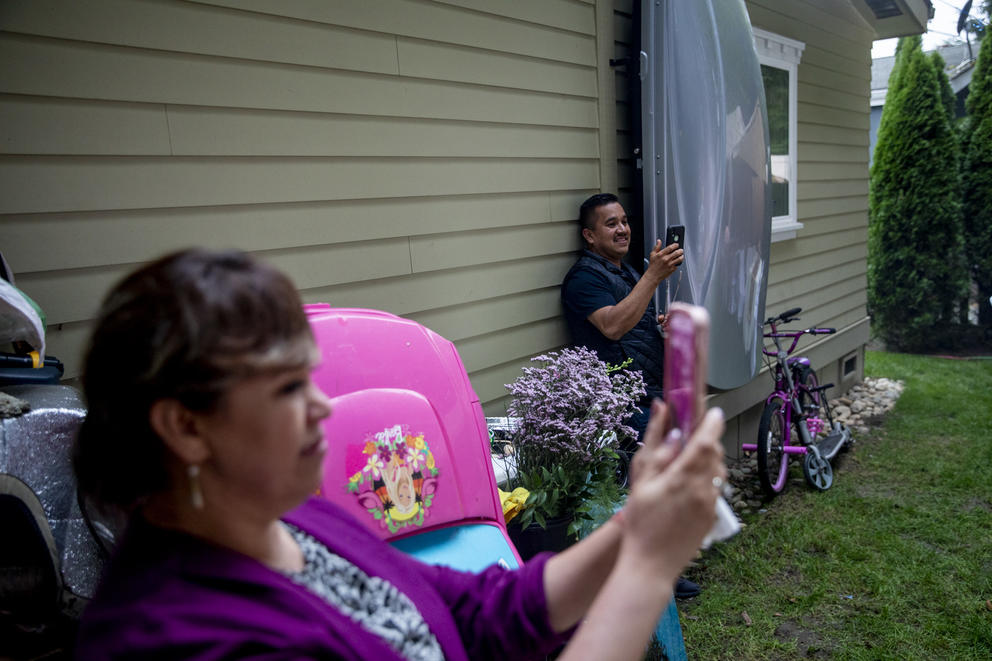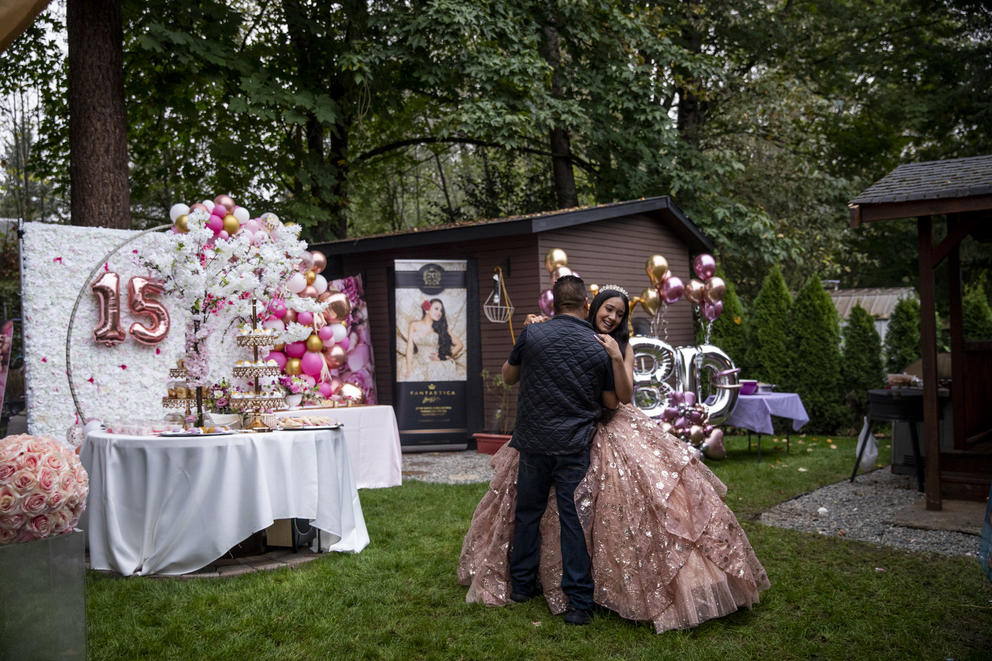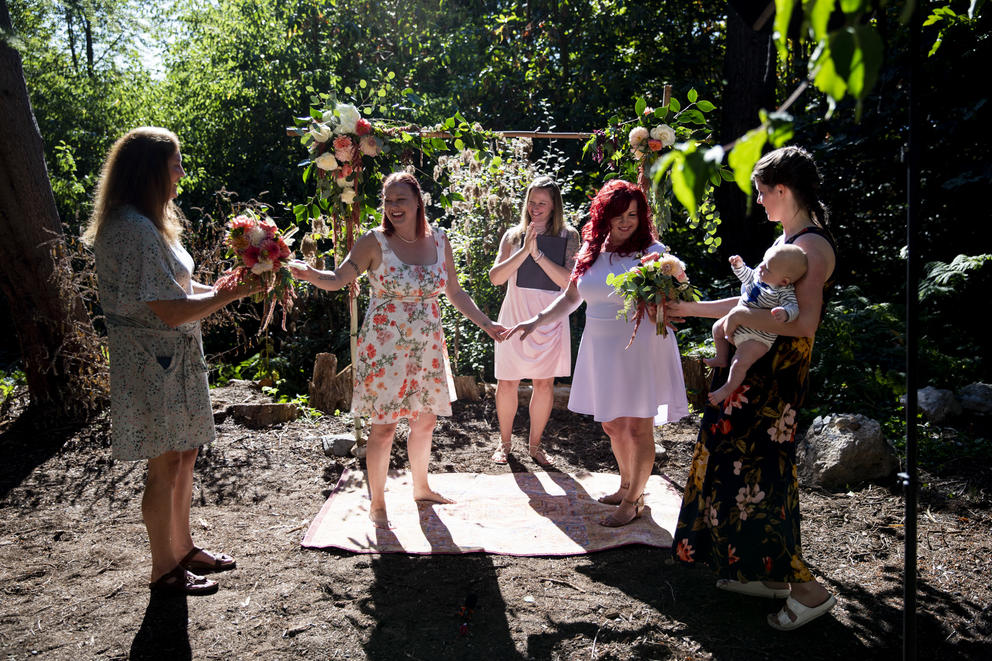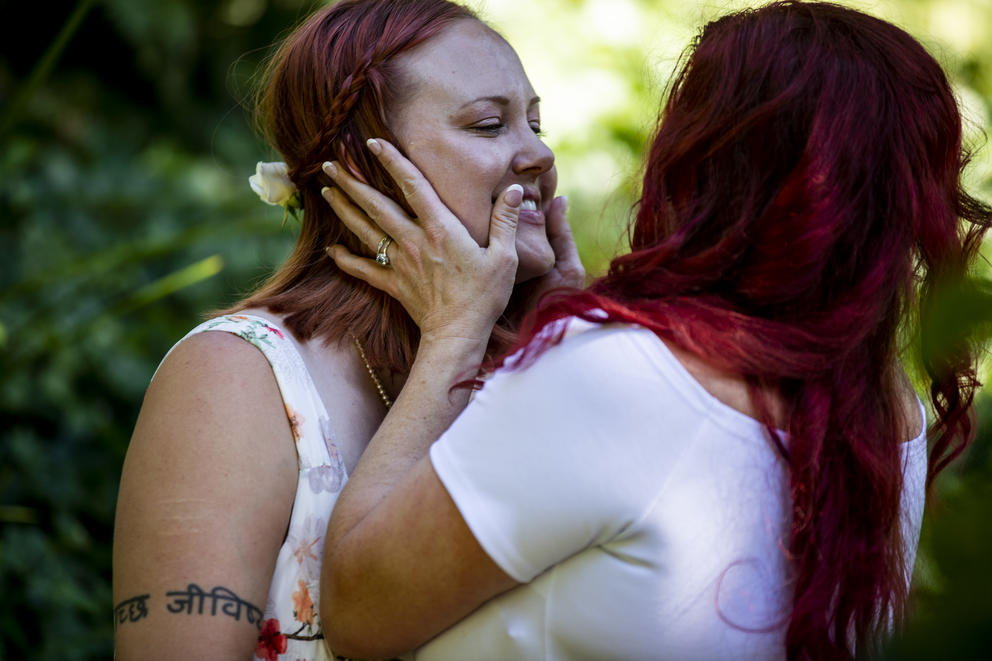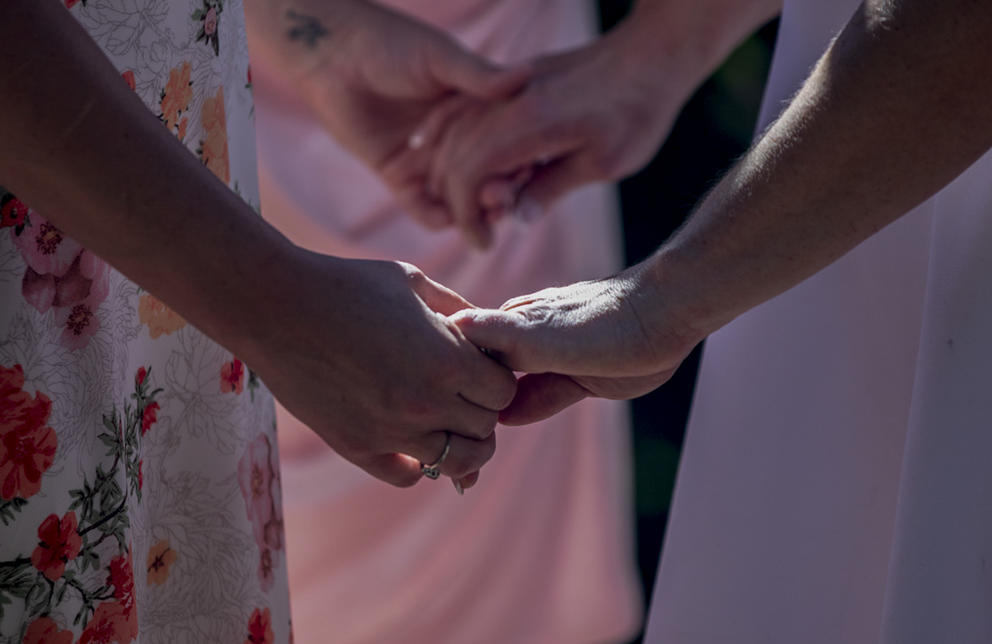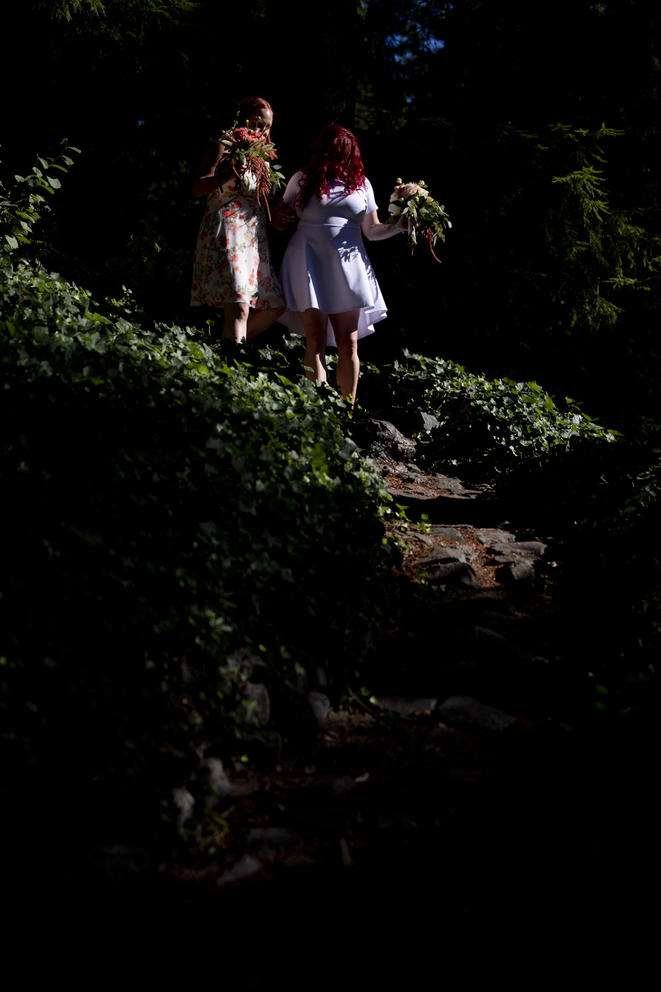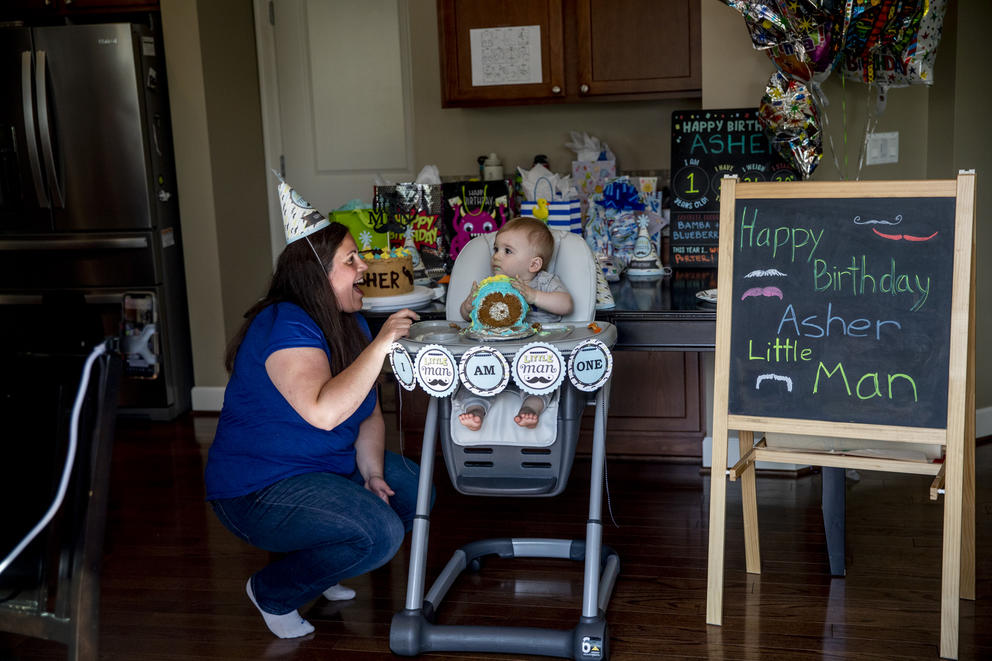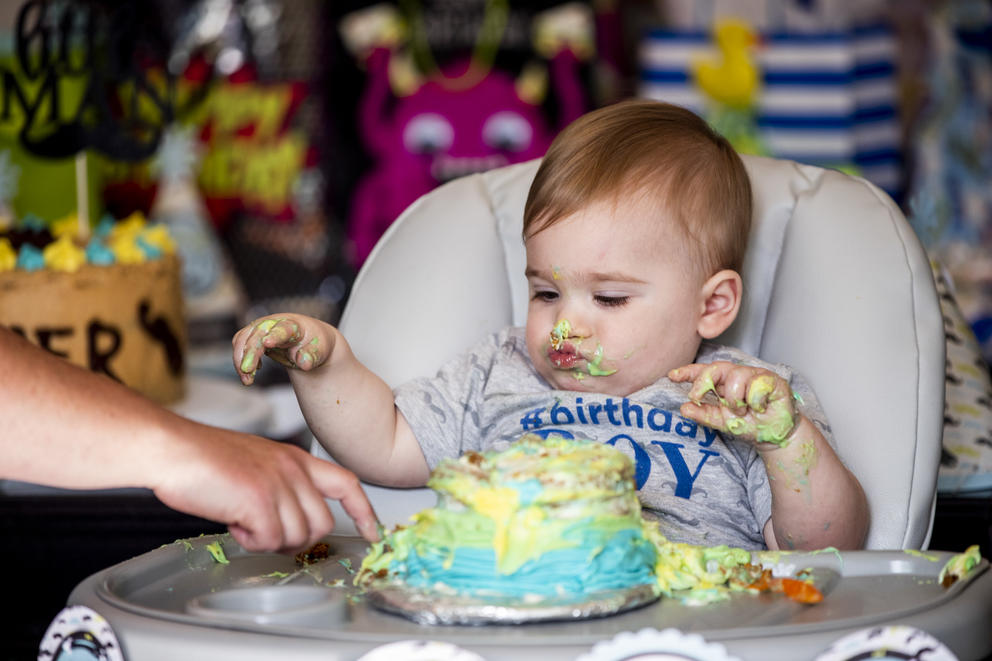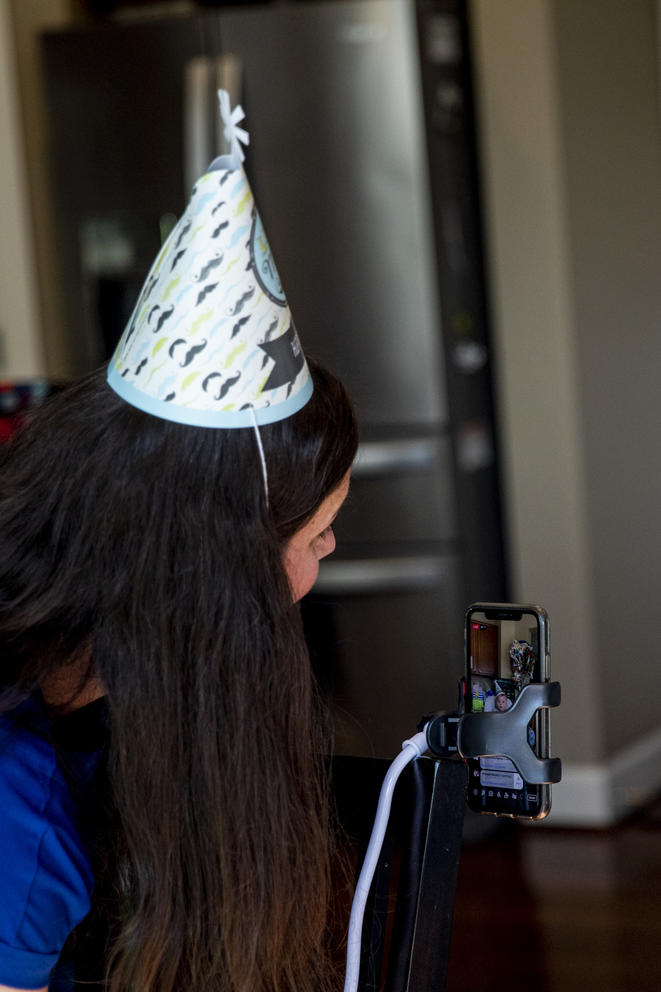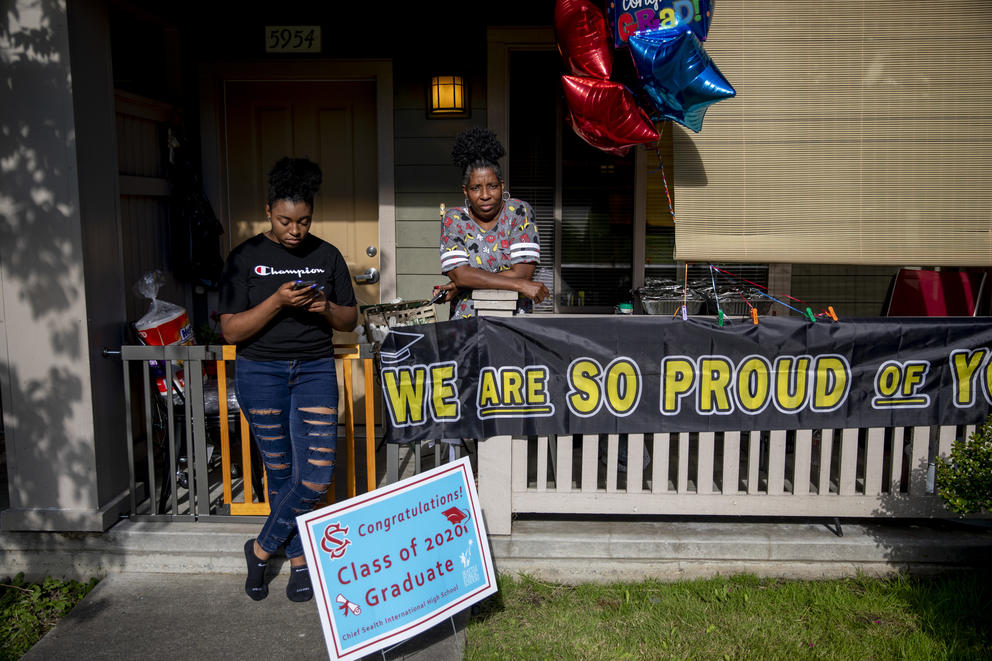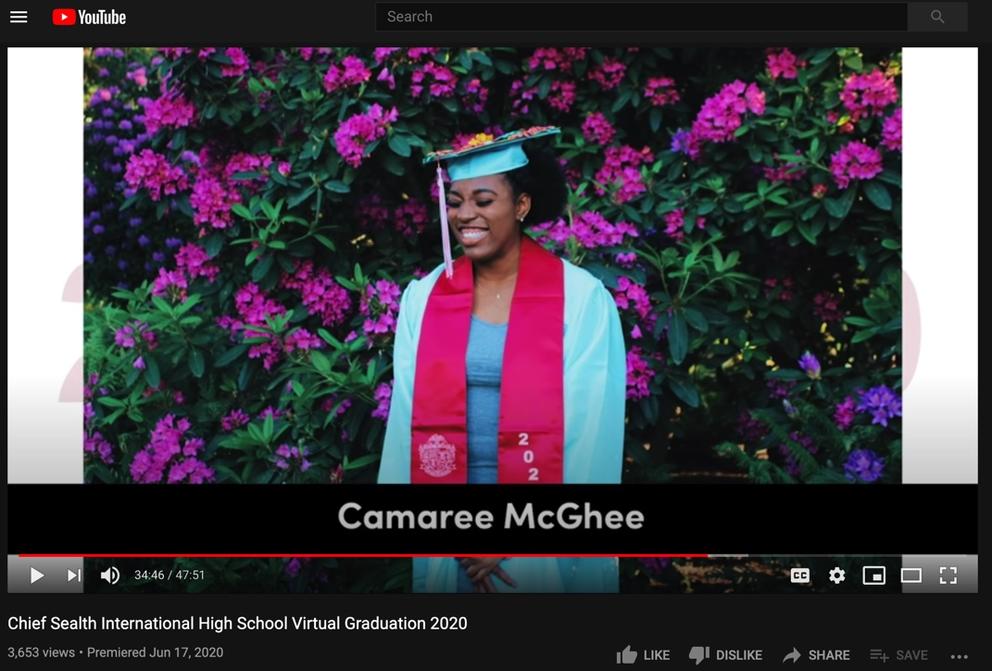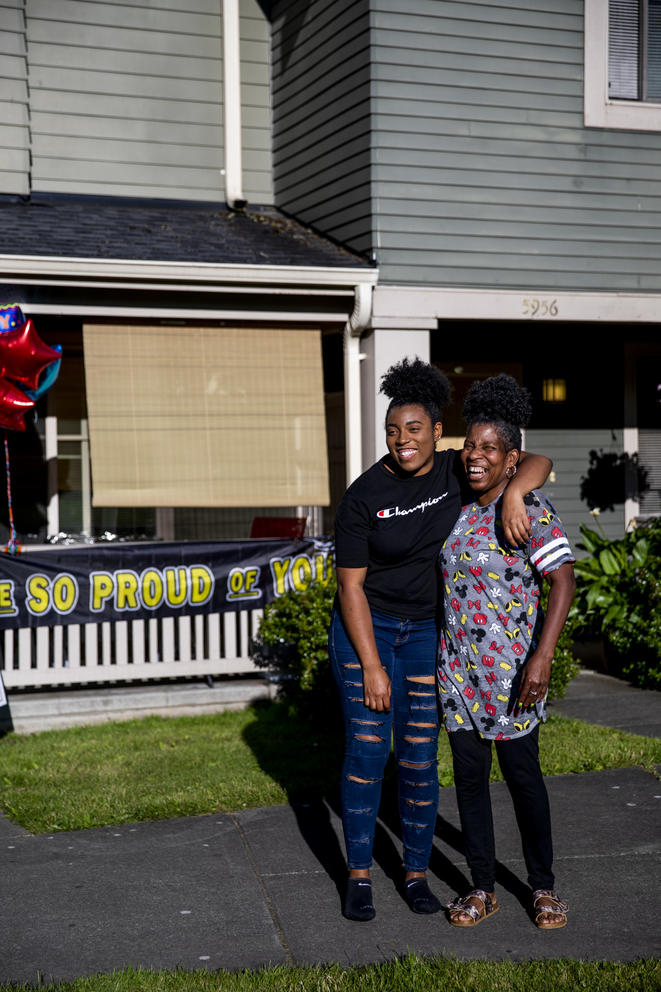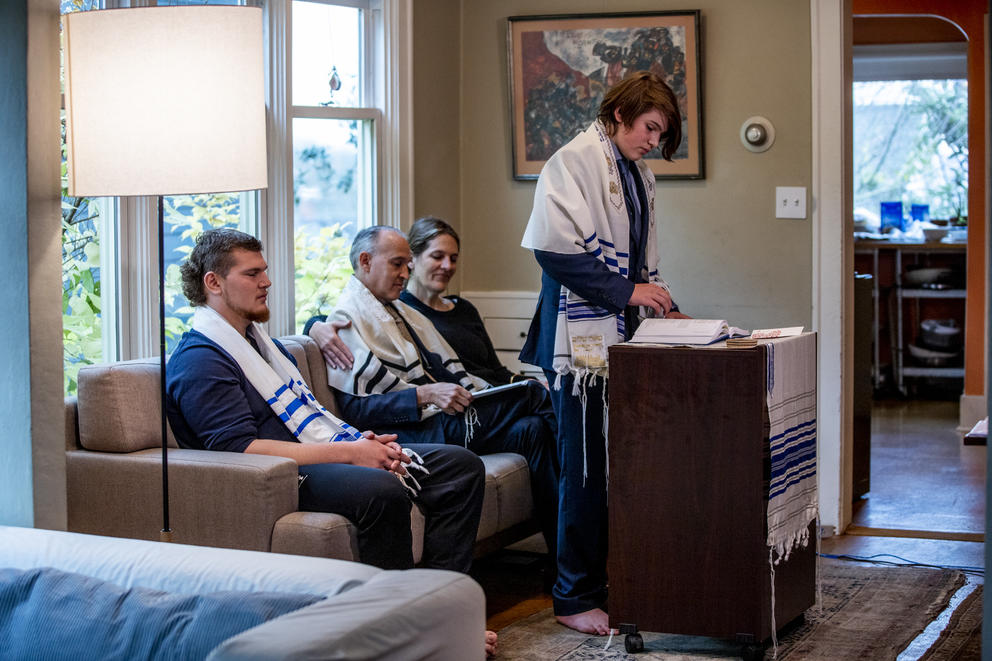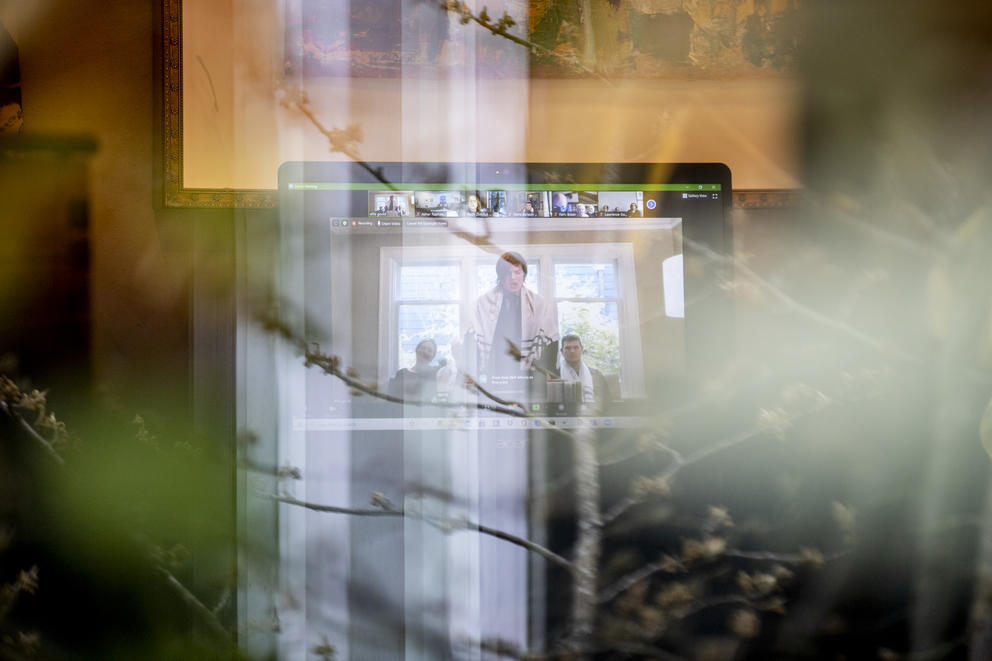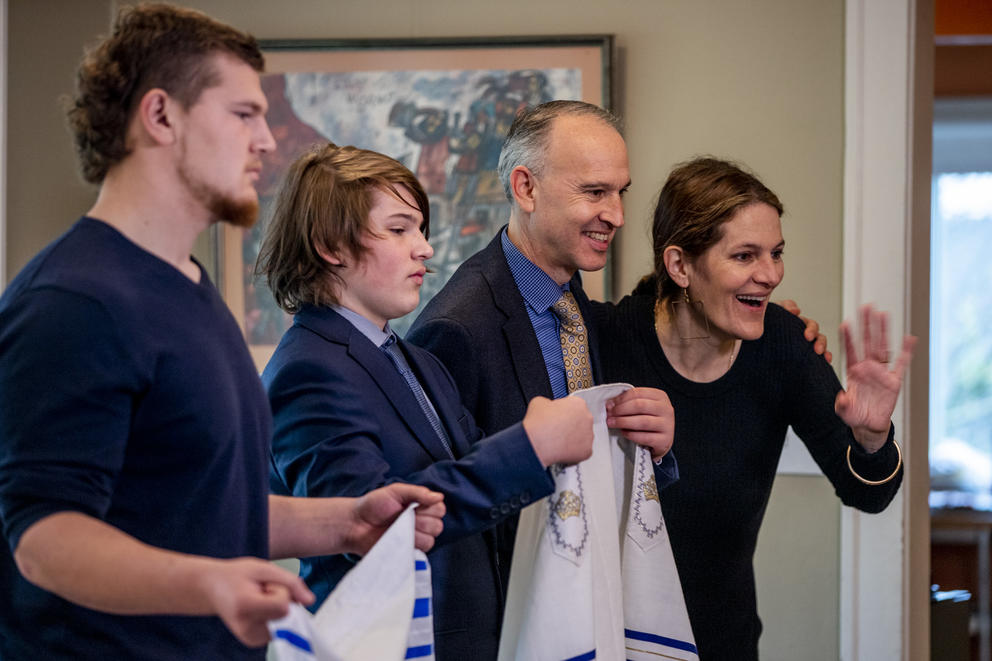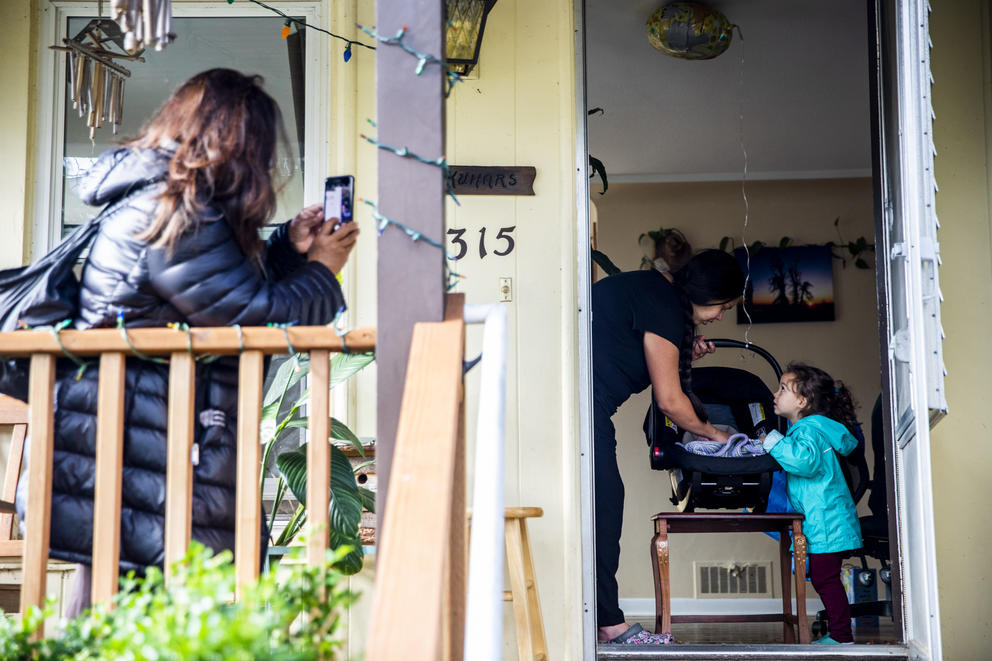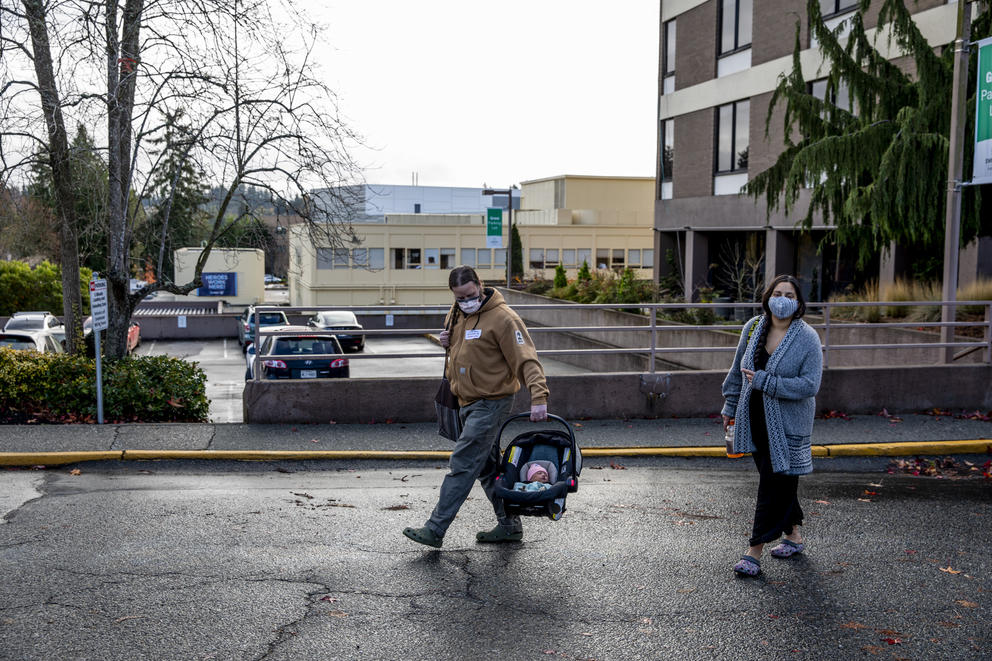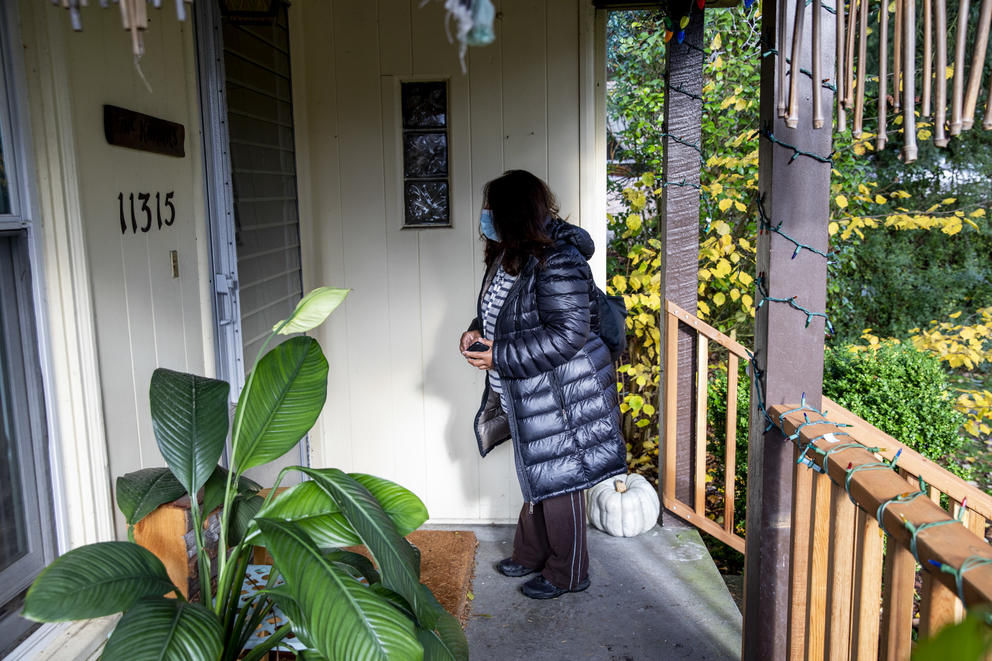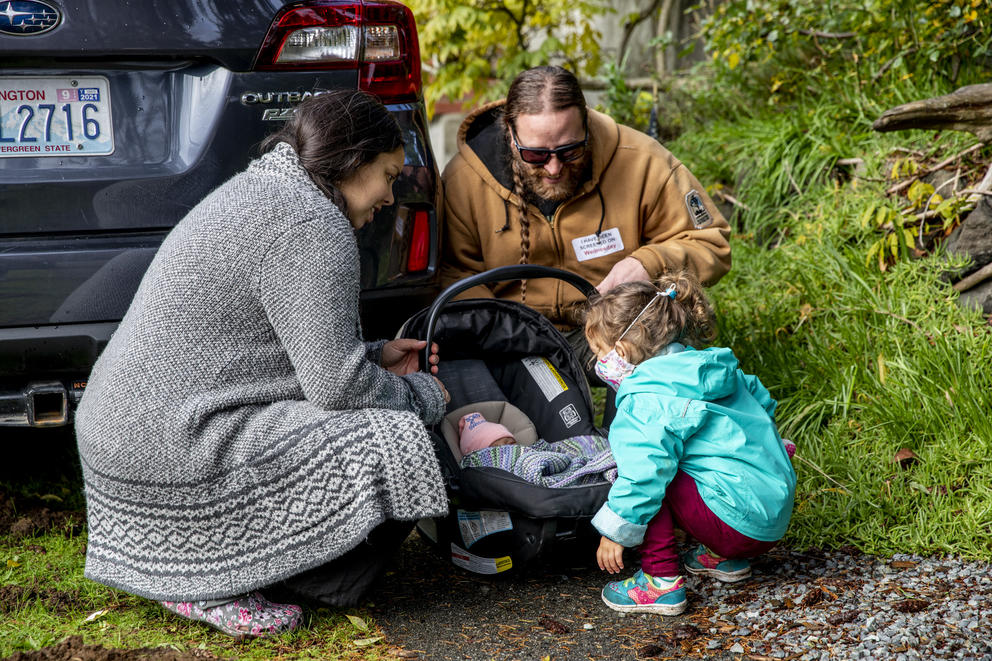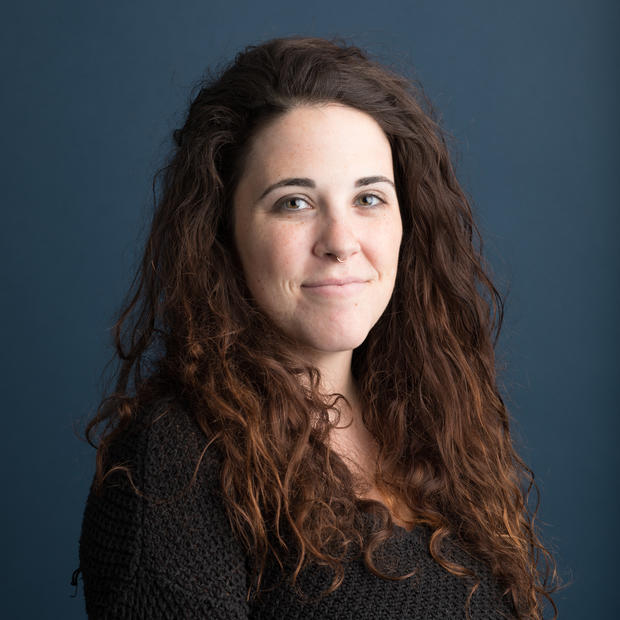Quinceañera
As Evelyn Hernandez and her mother, Mariana, danced to “Mi Primer Amor” by Pesado (the same song Mariana danced to with her mom on her wedding day), they held each other, crying. This was not the celebration day they had imagined during the years of dreaming about Evelyn’s quinceañera.
“She’s [Mariana] always dreamed about it,” Evelyn said. “Me and my mom have always had those conversations about, ‘Oh, when you’re older, your quinceañera will have this, this and that.’ ”
Growing up in Mexico with little money, Mariana didn’t get a quinceañera. She said it was important to her to give her daughter something she never had herself. “It was something I looked forward to for a long time,” Mariana said in Spanish.
Mariana owns Fantastica Beauty Salon in Burien, where Evelyn grew up watching her mother do other girls’ hair for their own quinceañeras. Over the past 20 years, the clients at Mariana’s salon have become a close-knit community, and she said everyone was anticipating Evelyn’s special day. There were going to be nearly 800 guests.
So when the pandemic hit Washington and restrictions were placed on in-person gatherings, Evelyn and Mariana’s vision started to slip out of grasp.
On Oct. 3, just a handful of close family and friends gathered in the family’s backyard for a scaled-down celebration. Evelyn and a couple friends took photos in front of the pink and floral decorations while her dad, Jorge, made carne asada on the grill. Evelyn took turns dancing with each member of her family — her mom, dad and little sister — and said she couldn’t help but feel emotional.
Although Evelyn’s day was different from what she imagined, she said she didn’t feel disappointed. She felt thankful, reflecting on everything her parents had done for her.
“Both of my parents giving me everything I have and not having to worry about anything else. I just let that sink in,” she said, “like they're really here for me. They're always going to be here for me.”
Wedding
Maia Sage and Jessica Johnson got engaged almost three years ago and have been together for nine. And like many couples with a wedding planned for this year, they made the difficult decision to cancel the ceremony.
But the idea of waiting to get legally married, even without all of their loved ones present, wasn’t really an option for them.
“So it was just one of those, ‘I just want to fucking get married,’ to be quite honest, and we're getting older, and I just really don't want COVID taking that away from me,” Maia said.
Getting married was a way to take a little bit of control back in a time where so much felt out of their control. If something were to happen to one of them during the pandemic, they wanted to be legally tied to each other.
“I mean, that’s a morbid thing to think about,” Jessica said. “It's more of a security of knowing that we're bonded and that we are able to take care of each other.”
Canceling their original, big ceremony of 120 guests was a moral decision for the couple. They would have been devastated if someone got sick at their wedding. But that didn’t mean the decision didn’t come with a real sense of loss.
“It took about a week to kind of get through the grief process of it because we were pushing so hard to try to make it happen, and really holding out hope that it was going to happen,” Jessica said. “We were pushing for something that was unrealistic.”
They wanted their loved ones to be able to hug and dance at their wedding, without any fear. “It wouldn't be the same freedom and joy that you would find [at a wedding],” Maia added.
So after deciding to do an intimate ceremony at home instead, the couple spent the summer landscaping, pulling weeds and hauling branches behind the Burien house they call their “treehouse.”
On Aug. 28, surrounded by trees and centered on a hand-built bamboo arch with pink and white flowers perched on top, they got married. With Maia’s mother and Jessica’s daughter and baby grandson at their side, it was a quiet and intimate expression of their love for each other.
First birthday
When the pandemic invaded the Pacific Northwest, Jennifer and Ben Morhaime became stay-at-home workers, parents and teachers. They had to adjust to a completely new lifestyle, often working until 11 p.m. to get stuff done while the kids were asleep.
“We both work full time and having to try and tag team being a stay-at-home parents and a teacher to the two boys and also balancing work was a big adjustment,” Jennifer said.
For their younger son Asher’s first birthday in June, nearly four months into the pandemic, the family wanted to find a creative way to bring their loved ones together and celebrate — to bring some light into the world.
The Morhaime family loves birthdays. Their older son, Porter, now 4 years old, had 75 guests at his first birthday party.
“Birthdays are very important to me,” Jennifer said. “You know, there's holidays and there's all kinds of stuff throughout the year, but your birthday is the one day that's about you.”
Because of the risk of contracting coronavirus at large in-person gatherings, the Morhaimes decided the best way to celebrate with their friends and large family was to livestream baby Asher’s birthday cake smash. “Everybody loves to watch a baby get cake all over them,” Jennifer said.
So on June 10, hundreds of friends, long-distance family members and neighbors logged in to the Facebook livestream to watch baby Asher, dressed in his “birthday boy” shirt and a blue and yellow cardboard cone party hat, make a mess of his carrot cake.
“We're all looking for something happy and joyous to watch and with all the horrible things going around, it brings joy to everybody,” Jennifer said. “We all need that light right now.”
Viewers offered birthday wishes and messages of love in the comments, and for the livestream’s 22 minutes, there was no mention of COVID-19 or the worry and stress of balancing work and kids — there was just celebration.
Graduation
When Camaree McGhee’s name was called during Chief Seattle High School’s virtual graduation on June 17, instead of watching her walk across a stage, her family and friends saw a photo of Camaree in her cap and gown flash on the screen for about three seconds.
Maybe for most teenagers, this would be a huge letdown — not going to your own graduation ceremony or partying with your friends afterward. But for Camaree, she was just excited to have finished high school and get accepted to her dream school, Seattle Pacific University, with scholarships.
Camaree figured out she had a learning disability in high school that made math and reading harder for her. She got some extra help and didn’t let the learning disability slow her down.
She was president of the Black Student Union, started on the varsity basketball team as a freshman, received a Coach’s Award for basketball and a Notable Achievement Award for her leadership as a student, all while maintaining A’s and B’s all four years.
“She made herself stronger by just hanging in there, doing what she could, asking for help and just staying on track,” her mother, Andrea Haynes, said. “I am really proud.”
Regardless of how graduation ceremonies had to be adapted during the pandemic, Andrea said the most important thing to her was that her daughter was recognized in some way. She didn’t want her accomplishment to go unnoticed.
“I didn't care about no speech or nothing, I didn't even care about the cap and gown. I just wanted to make sure she would be recognized,” Andrea said, “Hey, she's done it! Yes!”
So the Sunday following graduation, the mother-daughter pair decorated their home with “congrats grad!” balloons and signs, turned on music and spent the afternoon eating and talking on their porch. One friend of Camaree’s came by to bring her a gift and celebrate for a bit, but Andrea said it was just the two of them relaxing, eating and talking.
Bar mitzvah
The night before his bar mitzvah in November, Ellis Gould couldn’t sleep. He was nervous.
“I was going to bed, I was listening to music and then at 11 o'clock, I was like, ‘Holy shit, I'm having a bar mitzvah tomorrow. Oh my gosh.’ ” he said.
With his parents and older brother asleep, Ellis went into the living room and took out the Torah scroll. He read it over about seven times before going to bed. To help his nerves, he reminded himself what was most important about the next day: “A bar mitzvah is not about completion. It's not about memorization. It's really about community. It's about you making an effort to show up.”
The next morning, Ellis and his family sat snug in a row on their couch, a laptop open on a table in front of them, as about 300 family members and friends joined them on a Zoom call.
Deciding to take Ellis’ bar mitzvah virtual was a family decision, but Ellis made the final call. His father, Jon, said he watched his son really take ownership of the experience after the decision — maybe even more so because it was online.
“We didn't have any sense of, ‘Oh, this is a loss,’ ” Jon said, “He went right to the, ‘Wow, I can have this in my house! This is going to be in our living room!’”
Jon said that when the reality hit that the bar mitzvah wasn’t going to be in a temple, it removed this piece of the experience that wasn’t as important to his son — the place it occurs.
“It really kind of stripped it down to what is the meaning of a bar mitzvah, which is not so much, for Ellis, tied with something that is called Temple Beth Am that just happens to be in northeast Seattle; for him, it's much more about a broader definition of community,” Jon said.
Although Ellis became a bar mitzvah — meaning he assumed his position in the adult world— both he and Jon expressed some disappointment they couldn’t be physically near their loved ones.
“The day of, I felt all of the pride and the joy and the sense of arrival that comes with a rite of passage, especially one that has to do with parenting and community,” Jon said, “and at the same time, I felt really distant from the community of family and friends and that was really hard.”
“I would have loved to see all of my family members' faces in front of me as I presented to them,” Ellis added. “I might not have seen them in person, but they're there for me.”
Jon explained that even though Ellis is the youngest, he is looked to as more of the elder, the moral compass, by his family. This was exemplified in his thoughtfulness and seriousness throughout the ceremony.
“When the bar mitzvah ended, I was like, ‘Everyone has acknowledged me for being a man at this point’,” Ellis said. “I've done this ceremony and was like, ‘Oh my God, I have a really cool accomplishment that I'm going to carry with me throughout the world.’”
Birth
Priya Pugh and Matthew Kuhar found out they were expecting their second daughter, Ava, just days before the state’s “Stay Home, Stay Healthy” order was put into place in March. Then, in a matter of a week, they pulled their 2-year-old daughter, Sierra, out of day care and Priya began working from home.
The couple was thankful this wasn’t their first experience with pregnancy because this time around, Priya had to go to doctor’s appointments and most ultrasounds by herself. The couple also carefully limited who they saw in-person. Each of their sisters would help out when they could, but were very cautious and wore masks.
“It was a very lonely experience this time around,” Priya said.
While the pregnancy was physically lonely, Priya said she felt a different kind of community around her — one that wasn’t based on gathering in person, but still involved taking care of each other. For example, one of their neighbors offered their Airbnb space to Priya’s mother, Jayshree, to quarantine after she flew in shortly before the birth. They also offered Jayshree outdoor blankets and hand warmers as she sat on Priya and Matthew’s front porch, sharing meals and interacting with her family through a window.
Priya said it was really special to be able to walk Sierra to the end of the driveway to see her grandma, whom Sierra calls “Nanima” (which means “grandma” in the part of India where Jayshree is from).
"There's just a different type of community right now,” Priya said. “I feel like we got close with our neighbors in different ways, I'm thankful for that, and I'm thankful for my mom that she was willing to come.”
It was a difficult decision for Jayshree to fly to Seattle. Priya’s father also was planning to come help with the new baby, but he canceled his trip, as did Matthew’s parents.
Ava was born on Nov. 24 at Swedish Medical Center in Edmonds. Even though just Priya and Matthew were allowed at the hospital, and with the backdrop of all of the worries connected to the pandemic, Priya said when she was giving birth and met her daughter, she saw a light at the end of the tunnel.
“Matt and I were connected in a way that we hadn't been before,” Priya said. “None of the other stuff mattered in those moments, like, the rest of that stuff dissipated. And it was just like focusing on the birth and bringing a new baby into the world.”
When they came home with their new daughter, they were greeted outside by their other daughter, Sierra, and Priya’s sister and mother — all in masks.
Sierra gave her new sister kisses, while Priya’s mother and sister took photos on their phones from a distance. The couple and their daughters went inside their home and Priya’s mother returned to her spot on the porch by the window — everyone oohing and aahing over little Ava.
“It is a gift,” Priya’s mother, Jayshree, said, peering through the window, “I am just so thankful.”

